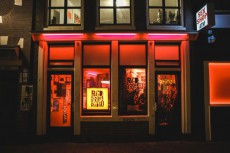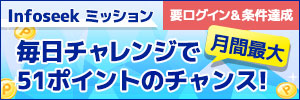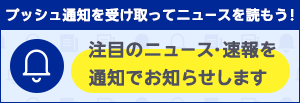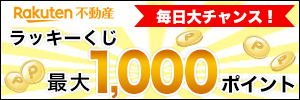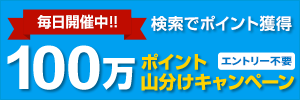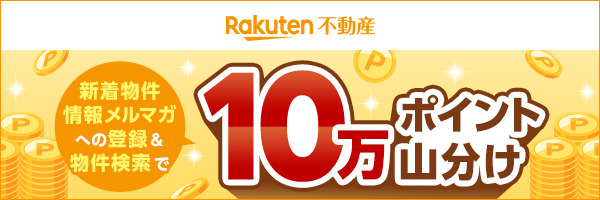.nl issue:オーディオ愛好家のバー、レコードショップ、商品開発などの新しいベンチャーに進出する、実験的メンタリティを持ったオンラインラジオRed Light Radio/ interview with Hugo van Heijningen, founder of Red Light Radio
NeoL / 2020年3月28日 20時47分
.nl issue:オーディオ愛好家のバー、レコードショップ、商品開発などの新しいベンチャーに進出する、実験的メンタリティを持ったオンラインラジオRed Light Radio/ interview with Hugo van Heijningen, founder of Red Light Radio
オランダのクリエティヴ業界を盛り上げているアーティストたちを取り上げる「.nl Issue」。近年、多くの国が国境を閉鎖しナショナリズムが高まり、世界共通の言語でもあるアートを通して団結することが以前よりも重要となってきている。NeoLでは、現在の状況と予測不可能な未来のために、議論ができる空間を様々な形で人々に提供するアーティストやアクティビストへのインタビューに取り組み続けている。本特集では、限界に挑み続け、フロントランナーとして走るオランダに在住するアーティストを紹介し、国の魅力についてはもちろん、今現在の環境、社会構成、政治などの問題を乗り越えるために必要とされる緊急性と行動力を喚起したい。
2010年、Hugo van HeijningenとOrpheu De Jongは、実験的メンタリティを持ったRed Light Radioを発表した。10年が経過してもなおステーションが同じDIYアプローチを保持していると彼らは誇っている。このオンラインラジオ(Dekmantelなどのフェスティバルなどをプログラムし、最近ではRecreo Festivalのためにチリから番組を放送している)が、まだ3人のフルタイマーと少数のボランティアによって運営されているとは! アムステルダムの街の高級化が進み、多くの文化的先駆者たちが仕事を見つけるのに苦労するなか、制度に縛られていない自主性を持ち、急増しているオンラインのラジオプラットフォームのパイオニアとなるユニークな存在だ。Red Light Radioは、ここ数年でオーディオ愛好家のバー、レコードショップ、商品開発などの新しいベンチャーに進出。それらがすべてがどのように始まったか、そしてこれからの未来について語ってくれた。(→ in English)
ーー2010年にRed Light Radioが設立されてからほぼ10年が経ち、現在ではレコードショップ、商品開発、バーなど、他のベンチャーにも進出しています。これら多様な文化的動きの原動力となるものはなんでしょうか。
Hugo「もちろん音楽です。 “Let’s see how it goes(どうなるか見てみましょう)”は、私たちが過去10年間言ってきたこと。最初は数か月すら続くかわかりませんでした。3か月後に契約が数か月延長され、1年、3年、5年になりました。ビジネスを運営する方法を私たちが何も計画しなかったということではないのですが、その時々で私たちが持っているものを最大限に活用することが大事なんです。その考え方はずっと変わりません。だから、Red Light Radioは依然としてDIYなプロジェクトなんです」
ーーあなたはニューヨークのEast Village Radioに触発されたそうですが、特にユニークでRLRに組み込む価値のあると思ったものは?
Hugo「私は音楽を通して人々をつなぐのが好きです。ある時、ドキュメンタリー映画のインタビューをすることになり、East Village Radioでショーをするアーティストを待っていたことがあって。残念ながら彼は姿を現さず、パンクショーからジャズの生演奏に切り替えられ、その翌日にイーストビレッジのラジオを通り過ぎたらエレクトロニックミュージックが流れていました。そこを通り過ぎるだけで地元の音楽シーンを垣間見ることができるなんてとてもクールだと思い、アムステルダムでも同様のことをやってみることにしたんです」
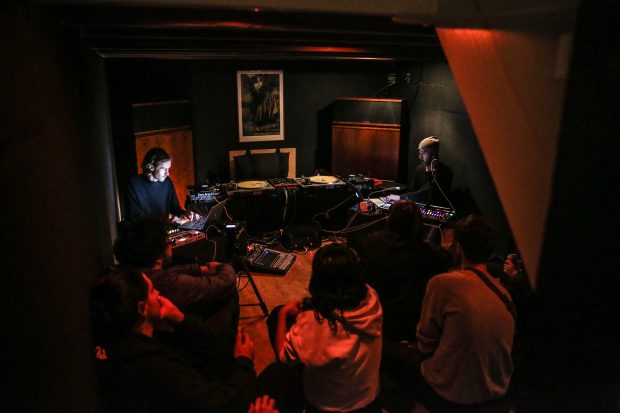
ーーステーションは歓楽街の通りにありますがここに設置することにしたのはなぜですか。また、RLRの存在がこのストリートをより多くの聴衆にアピールするのに役立っていると思いますか?
Hugo「Red Light地区はスペースを文化的イニシアティヴのために貸し出そうと、アーティストを探していました。セックスワークがこの歴史的中心部で起こっているべきものであっていいのかという、約20年の間続いている議論もありました。人身売買、そして人々の意に反して物事が行われているということについてです。何が現実で何が現実ではないのかはわかりませんが、地区がいくつかの建物を購入し、近隣を変えようと売春宿のライセンスを剥奪していたことは知っています。観光客のためだけでなく、このユニークな魅力を持ったアムステルダムのスペースのために、ラジオ局を設けるのは良いことだと思ったんです。もともと売春時間に使用されていたこれらのスペースのサイズはラジオ局に最適で、非常にうまく機能しましたよ。
より多くの聴衆にアピールするという点では、レコード店がそういう機能を果たしていると思います。多くの人がレコードを探しに来たり、ラジオメーカーがショーを行ったりするので、建物や音楽スタジオのために、通常は歓楽街に来ない人がたくさん来ています。一方、過去10年間で観光客の数は完全に手に負えなくなってきました。地元の人も増えてきましたが、それと同時に観光客も増えて賑わっており、バランスが悪いと感じています」
ーーオンラインストリーミングサイト、Youtube、Soundcloudなどの音楽メディアプラットフォームの数が増えていますが、今の社会でラジオ放送が果たす重要な役割は何だと思いますか?
Hugo「Soundcloudが登場した10年前、ミックスを作成して共有し、さまざまなデバイスで再生できるのは嬉しかったです。オンデマンドでプレイするために、広告が途切れることなく流れていましたけどね。オンラインは、昔ながらのラジオのやり方よりもはるかに優れていると思いました。興味深いのは、Soundcloudにはライヴストリームよりもはるかに多くのリスナーがいるということです。Facebookのライヴが始まったとき、私たちは実装するのが非常に速かった。Facebookでライヴ配信することで、ボイラールームよりもさらに高速だったと思います。初期の頃、まだ有名でないローカルDJが何百万もの人々に音楽を届けることができて、信じられないくらい嬉しかったのです。本当に素晴らしい時間でした。現在、Facebookのアルゴリズムはライヴストリームを推進していないため、ウェブサイトの存在をアピールするくらいしかやっていません。私たちは常にメインプラットフォームをSoundcloud、facebook live、webサイト、アプリから切り替え、人々の好みに合わせています。誰もが自宅にラップトップを持っていて、誰でもチューニングできます。シグナルがあればショーのクレイジーな音楽を聴くことができますが、気に入らなければスキップして自分のことをやることができます。ソーシャルメディアでは、スタジオに素敵なアーティストがいるかどうかを確認し、日程を調整することができます。だから私たちはたくさんのアウトレットを持っていて、誰もが快適に感じることができる方法を見つけるために時代とともに変化しようとしています。それが始まりであり、今まで残っている方法です」
ーーRLRはオンラインラジオのパイオニアだと思いますか?
Hugo「いいえ。Dublab、Intergalactic FM、East Village Radioは以前からオンラインラジオを行っていて、非常に未来的でした。しかし、The Lot、Mutant、Kioskなどの世代のオンラインラジオ局の中では、RLRはある意味でパイオニアだと思います。ロサンゼルスのDublabも以前からやっていたし、絶対的な自信を持って言うことはできませんがね。何はともあれ突然生まれた新しい種類のラジオメーカーたちの一部になれたことには感謝しています。これらのラジオ局すべてとコラボレートしており、私たちの間に築かれたコミュニティが強力であることも素晴らしいことです」
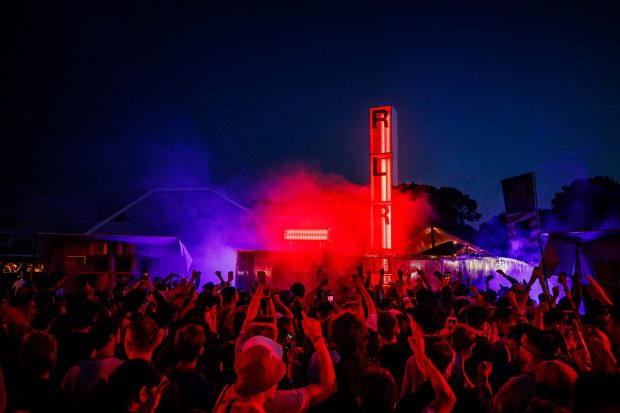
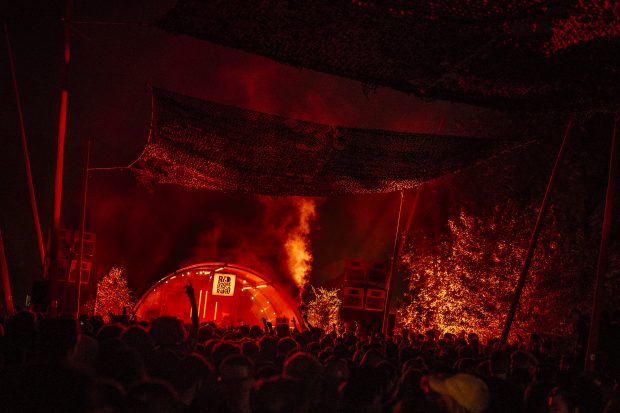
ーーリスナーからのフィードバックは重視していますか?もしそうなら、世界の各地で聴いている人から受け取ることができる最高の褒め言葉は何ですか?
Hugo「世界中に素晴らしいファンがいてくれます。一部のラジオ局は否定的なコメントをもらうようですが、私たちは非常に優れたリスナーと、私たちのラジオ局を愛する人々からの肯定的なフィードバックを得ています。それらは私たちがしていることを続けるエネルギーを与えてくれるんです。プログラムについて質問がある場合はラジオメーカーに連絡することができますし、私たちが受信トレイでメッセージを受け取った場合、彼らはDJと直接話すことができます。私たちはグローバルコミュニティを作っていて、めったに否定的なコメントを受け取りませんが、そういうものをもらった時でももちろん真摯に耳を傾けますよ」
ーー他の多くの芸術家は、アムステルダムの都市化が進んでいて自由が失われつつあると感じているようです。都心にあるラジオ局としてもそう感じますか?
Hugo「同意しませんね。私たちは独立しており、政府からの助成金は受けていません。これは私たちが10年間やってきたことです。RLRは独立しているので、その意味でも非常に自由なんですよ。しかし、それらの意見もわかります。スペースの不足は創造性にとって良くないと思いますし、不法占拠を違法にする法律の犠牲になっている部分もあります。私は非常に実験的な時代に育ちました。そこでは不法占拠されたセンターがあり、人々が実験的に好きなことをすることができるかなりのスペースがありました。だから、もうそうではないのは残念だと思いますよ。Red Light Radioはユニークであり、自由なスペースであるからこそ必要とされているのです」
ーーレッドライトラジオは10月に東京に来ますね。長らくの夢だとおっしゃっていましたが、日本の魅力は何ですか?
Hugo「私は日本に2度行ったことがありますが、とても気に入っているんです。日本とのつながりはとても深いと思います。ヨーロッパと比べて非常に異なることがおいので、非常に興味深い。日本の音楽やDJも大好きなので、ぜひ訪れるべき場所ですよね。初期から私たちのステーションを聴き続けている日本人のリスナーがいるので、日本の音楽シーンに足を運んで、彼らの存在を知らしめるために私たちのプラットフォームに参加してもらうのも素晴らしいでしょう。あと、美味しいものも食べられますしね(笑)。Orpheuと私は日本から発信されるものの大ファンであり、来日できるのを心待ちにしていたのでとても興奮しています」
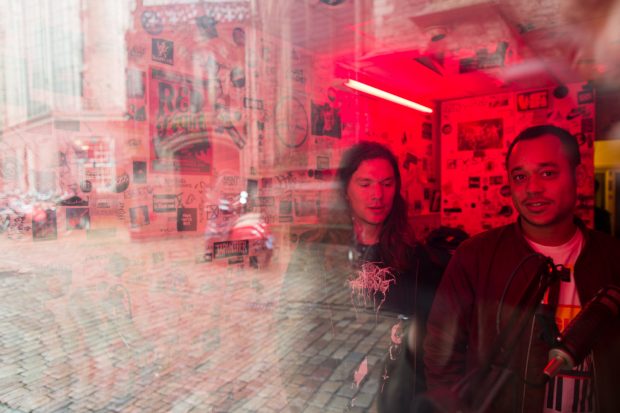
text Ayana Waki
Red Light Radio
Red Light Radio is an online radio station and international music platform based in Amsterdam’s Red Light District. Since 2010 RLR broadcasts daily shows of local and international artists, does parties & concerts and collaborations with festivals, museums & other cultural partners all over the world.
http://redlightradio.net/
https://www.instagram.com/redlightradio/
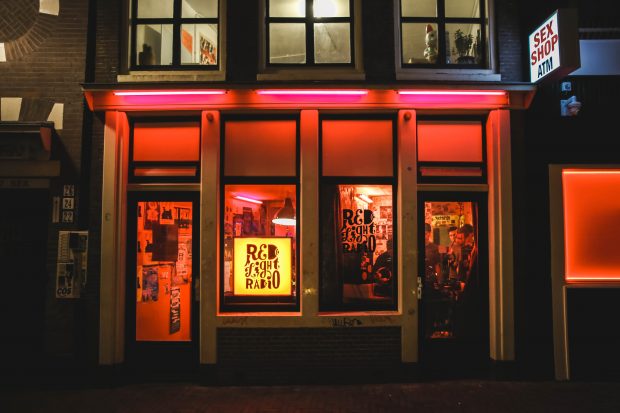
In 2010, Hugo van Heijningen and Orpheu De Jong launched Red Light Radio with a "Let's see how it goes" mentality. Ten years have passed and they are proud to say that the station has very much stuck with the same DIY approach. It is hard to imagine that this online radio - having programmed the likes of festivals such as Dekmantel and recently broadcasting a show from Chile for the Recreo Festival - is still being run by three full timers and a handful of volunteers. As gentrification increases on the streets of Amsterdam and many cultural initiatives are struggling to find their calling, maybe their autonomy, having been less attached and influenced by institutional boundaries is what makes their station unique and a pioneer within the recent upsurge in the number of online radio platforms. As Red Light Radio branches out into new ventures such as audiophile bars, record shops and merchandise over the past years, they talk to me about how it all started and the future yet to come.
-It has almost been ten years since Red Light Radio was founded in 2010 now expanded into other ventures including record shops, merchandise and a bar. As a new decade starts, what will continue to be the driving force behind this cultural initiative?
Hugo: It is of course, the music. ‘Let’s see how it goes’ is very much what we have been saying for the last ten years. We didn’t know if it was going to last for a few months at first. Then after 3 months the contract was extended with a few more months. Then a year and then three to five years. I am not saying that we don’t plan anything because that is not the way to run a business but it very much relies on making the best of what we have at that moment. The mindset remains the same, which is why Red Light Radio is still very much a DIY project.
-You were inspired by East Village radio from New York. What in particular about this station did you find unique and worth incorporating into RLR?
Hugo: I like to bring people together through music. I was at East Village Radio for a different reason, doing an interview for a documentary film there. I was waiting for a guy who had a show there. Sadly he never showed up but luckily in that moment, I saw a punk show switch to a live jazz performance. The next day I was passing by East Village radio and heard electronic music. I thought that it was so cool to be able to get a glimpse of the local music scene there from just passing by and decided to try something similar in Amsterdam as well.

-The station is located on the streets of the red light district. Why did you decide to situate the station here and do you think the presence of RLR is helping the street appeal to a wider audience?
Hugo: I knew that spaces on the Red Light District could be rented out for cultural initiatives and they were looking for artists to secure a space there. There has been a discussion going on for around two decades about whether sex work is something that should be happening in this historical center. Stories about human trafficking and doing things against their will. We don’t know what is real and what is not, but all I know is that they had bought some buildings and took away the licenses of these prostitution spaces to help change the neighborhood. So we thought that having a radio station inside of the window to turn the space into something for Amsterdam and not just for tourists in this unique neighborhood would be nice. The size of these spaces that were originally used for prostitution windows are actually perfect for a radio station and it worked very well. It all came together.
In terms of appealing to a wider audience, I guess the record store is. More people come to find records and radio makers come to do their show here so lot of people who wouldn’t normally come to the red light district are coming now because of our building and the music studios. On the other hand, in the last ten years the amount of tourism has completely gone out of hand. So the amount of local people has increased but at the same time, a lot more tourism came in, making the street very very busy and the balance makes me feel uncomfortable in a sense.
-As the number of music media platforms including online streaming sites,Youtube and Soundcloud increase over time, what crucial role do you think radio broadcasting plays in our society today?
Hugo: For me, ten years ago when Soundcloud came in, it was nice that you could create mixes, share them and play them on different devices. To play them on demand, any time you like without any advertisements cutting in was something that appealed to me. This is why I thought that having it online was much better than the old school way of doing radio. The interesting thing is that, we have much more listeners on our Soundcloud than on our live streams. When facebook live started, we were very fast at implementing it. I think we were even faster than Boiler Room with going live on facebook, so that was something that we did earlier on. In the beginning, that was incredible because some unknown local DJ could reach a million people with their obscure music that they were playing. Those were really nice times. Now, the algorithm of Facebook is not pushing livestream so we don’t do it as much making the presence of our website more important. We are constantly switching our main platform from Soundcloud, facebook live, website, the app and adjusting to the people’s preferences. Everybody has a laptop at home. Everyone can tune in. If you have a signal, you can listen to the crazy music from our show but if they don’t like it, they can skip it and do their own thing. On social media, they can find out if there were nice artists in the studio and tune in the next day. So we have a lot of outlets and try to change with the times to find a way to make everyone feel comfortable. That is how it started and that is how it remains until this time.
-Would you say that you are the pioneers of online radio?
Hugo: No, because Dublab, Intergalactic FM & East Village Radio was doing online radio from way before and they were futuristic in their way. But I think in this generation of online radio stations that have been arising such as The Lot, Mutant and Kiosk, RLR is a pioneer in a sense. I can’t really say this with absolute confidence when Dublab in Los Angeles has been doing it from earlier on as well but all of a sudden, there was a new breed of radio makers that we are grateful to be a part of. It is also nice that we have been collaborating with all of these radio stations and the community that has been built between us is strong.


- Is feedback from your listeners something that you value? If so, what is the best compliment you can receive from a person listening from a different part of the world?
Hugo: We have such great fans everywhere. Some radio stations get negative comments on their feed but we have super great listeners and positive feedback on our comment sections from people who love our station. It gives me energy to keep on doing what we are doing. If somebody has a question about the program, we can connect them to the radio makers. If we get a message in our inbox, they can directly speak to the dj so we are creating a global community. We rarely get any negative comments but when we do we of course do listen to them as well.
-A lot of other artists are convinced that the freedom in Amsterdam is being taken out of the city as gentrification increases. Do you feel it too, as a radio station located in the heart of the city?
Hugo: I don't really agree. We are very independent and we do’t get any grants from the government. This is what we have been doing for ten years. Red Light Radio is still very much independent so we feel very free in that sense as well. I do understand where this opinion is coming from however. I think the lack of space is not good for creativity and the law that made squatting illegal has been taking its toll. I grew up in a very experimental age where there were centers that had squatting and had quite some space where people could experiment and do whatever they wanted. So I think that it is a shame that this is not the case anymore. That is why I think that Red Light Radio is unique and is needed as it is a free space.
-Red Light Radio is coming to Tokyo in October. You have said that this has been a long time dream but what about this country appeals to you?
Hugo: I have been to Japan twice now myself and I really like it there. I feel very connected to the country. I think it is very different compared to what is happening in Europe. Therefore it is super interesting for a person like me. I also like a lot of Japanese music and djs which is why I think it is a place where we should go. There are Japanese listeners who have tuned into our station from the very beginning so it will be nice to visit and give our platform to a Japanese music scene to show what they are about. We can also have nice food afterwards (laughs). Orpheu and I are super fans of what is coming out of Japan these days and we knew that this day would come one day so we are very excited.

text Ayana Waki
Red Light Radio
Red Light Radio is an online radio station and international music platform based in Amsterdam’s Red Light District. Since 2010 RLR broadcasts daily shows of local and international artists, does parties & concerts and collaborations with festivals, museums & other cultural partners all over the world.
http://redlightradio.net/
https://www.instagram.com/redlightradio/
関連記事のまとめはこちら
https://www.neol.jp/music-2/
この記事に関連するニュース
-
「自分にとって何が大切なのかを知ることができた」Jamie xx “In Waves”インタビュー
NeoL / 2024年9月16日 17時0分
-
広報戦略ミス?...霞んでしまったメーガン妃とヘンリー王子のNetflix新番組「POLO」
ニューズウィーク日本版 / 2024年9月14日 10時10分
-
Message from Anna Umemiya: “I began treatment for breast cancer on July 31.”
OTONA SALONE / 2024年9月4日 16時30分
-
【ミスミ】機械部品調達のAIプラットフォーム「meviy」/ ハンドクレーン業界シェアNo.1のアイコクアルファがmeviyを採用
PR TIMES / 2024年8月30日 13時15分
-
IS:SUE discusses their group philosophy: "I’m ishu. I’m cool and amazing just the way I am"
Rolling Stone Japan / 2024年8月23日 12時0分
ランキング
-
1「ぜんたーい、止まれ!」その入場行進なんのため? 元体育主任が語る、運動会で廃止すべきこと3つ
オールアバウト / 2024年9月20日 20時35分
-
2メルカリで「マイナス評価」が1つでもあったら売れなくなる? 購入を敬遠される可能性も……
オールアバウト / 2024年9月20日 20時40分
-
3「SHOGUN」エミー賞受賞を喜ぶ人と抵抗ある人 日本人がアメリカで最多受賞した本当の理由
東洋経済オンライン / 2024年9月20日 13時0分
-
4「高齢者に炭水化物は毒」は大ウソである…長寿国では「パン、そば、うどん」をもりもり食べている事実
プレジデントオンライン / 2024年9月20日 15時15分
-
53COINSの高級ドライヤー、めちゃ軽くて手が疲れにくくていいけど……
女子SPA! / 2024年9月19日 15時45分
記事ミッション中・・・
記事にリアクションする
![]()
記事ミッション中・・・
記事にリアクションする

エラーが発生しました
ページを再読み込みして
ください



